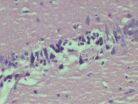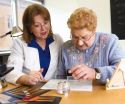(Press-News.org) It may smell of flatulence and have a reputation for being highly toxic, but when used in the right tiny dosage, hydrogen sulfide is now being being found to offer potential health benefits in a range of issues, from diabetes to stroke, heart attacks and dementia. A new compound (AP39), designed and made at the University of Exeter, could hold the key to future therapies, by targeting delivery of very small amounts of the substance to the right (or key) places inside cells.
Scientists in Exeter have already found that the compound protects mitochondria – the "powerhouse" of cells, which drive energy production in blood vessel cells. Preventing or reversing mitochondrial damage is a key strategy for treatments of a variety of conditions such as stroke, heart failure, diabetes and arthritis, dementia and ageing. Mitochondria determine whether cells live or die and they regulate inflammation. In the clinic, dysfunctional mitochondria are strongly linked to disease severity.
Professor Matt Whiteman, of the University of Exeter Medical School, said: "When cells become stressed by disease, they draw in enzymes to generate minute quantities of hydrogen sulfide. This keeps the mitochondria ticking over and allows cells to live. If this doesn't happen, the cells die and lose the ability to regulate survival and control inflammation. We have exploited this natural process by making a compound, called AP39, which slowly delivers very small amounts of this gas specifically to the mitochondria. Our results indicate that if stressed cells are treated with AP39, mitochondria are protected and cells stay alive."
Dr. Mark Wood of Biosciences, at the University of Exeter, added "Although hydrogen sulfide is well known as a pungent, foul-smelling gas in rotten eggs and flatulence, it is naturally produced in the body and could in fact be a healthcare hero with have significant implications for future therapies for a variety of diseases."
The research is being conducted in several models of disease, and pre-clinical results are promising. For example, in models of cardiovascular disease, research shows that more than 80 per cent of the powerhouse mitochondria cells survive under otherwise highly destructive conditions, if the AP39 is administered. Professors Whiteman and Wood are now working towards advancing the research to a stage where it can be tested in humans.
The study was published in the journal Medicinal Chemistry Communications. A follow-up study, published in The Nitric Oxide Journal with collaborators from the University of Texas Medical Branch, also found that the compound selectively prevented mitochondrial DNA in mitochondria. Once damaged, this DNA cannot be repaired, leaving individuals more vulnerable to disease symptoms.
Early indications in small-scale studies, presented at this year's 3rd International Conference on Hydrogen Sulfide in Biology and Medicine in Kyoto, also show that in high blood pressure, AP39 reversed blood vessel stiffening and lowered blood pressure. It also dramatically improved chances of survival after a heart attack by slowing the heartbeat, improving its efficiency.
INFORMATION: END
Rotten egg gas holds key to healthcare therapies
Hydrogen sulfide has potential benefits potential health benefits in a range of issues, from diabetes to stroke, heart attacks and dementia
2014-07-09
ELSE PRESS RELEASES FROM THIS DATE:
NIH launches Phase I clinical trial of novel drug to treat Clostridium difficile infection
2014-07-09
The National Institute of Allergy and Infectious Diseases (NIAID), part of the National Institutes of Health, has launched an early-stage clinical trial of CRS3123, an investigational oral antibiotic intended to treat Clostridium difficile (C. difficile) infection. CRS3123 (previously known as REP3123) is a narrow-spectrum agent that inhibits C. difficile growth while sparing normal intestinal bacteria.
The Phase I trial will enroll up to 30 healthy men and women ages 18 to 45 in a dose-escalation study to evaluate the investigational drug's safety and tolerability. Quintiles, ...
The impact of big data on health care: Health Affairs' July issue
2014-07-09
Big data can yield big savings, if they are used in the right ways. David W. Bates of the Brigham and Women's Hospital and coauthors analyzed six use cases with strong opportunities for cost savings—high-cost patients; readmissions; triage; decompensation (when a patient's condition worsens); adverse events; and treatment optimization when a disease affects multiple organ systems. They suspect that cost-savings benefits will vary widely, though the current costs associated with all six scenarios will be significant. The authors suggest that using analytics for multiple ...
Discovery of new drug targets for memory impairment in Alzheimer's disease
2014-07-09
VIDEO:
This is a movie showing how the reactive astrocytes in the brains of Alzheimer's disease model produce the inhibitory transmitter GABA by the enzyme MAO-B and release GABA through the...
Click here for more information.
Alzheimer's disease, which is the most common cause of dementia, is fatal and currently, there is no cure. In Alzheimer's disease, brain cells are damaged and destroyed, leading to devastating memory loss. It is reported that 1 in 8 Americans aged 65 or over ...
Neuroprotective effects of low concentration of lithium
2014-07-09
Lithium, as a neuroprotective agent, benefits for neuronal survival. Recent cDNA array studies have demonstrated that mood stabilizer lithium exhibits neuroprotective effects through multiple targets. Dr. Riadh Nciri and his team, Purpan Medicine Faculty, Paul Sabatier University, France, exposed SH-SY5Y cells to 0.5 mmol/L lithium carbonate for 25-50 weeks and then detected the expression levels of some neurobiology related genes and post-translational modifications of stress proteins in SH-SY5Y cells. cDNA arrays showed that pyruvate kinase 2 (PKM2) and calmodulin 3 expression ...
Filiform needle acupuncture versus antidepressant drugs for poststroke depression
2014-07-09
Whether acupuncture or antidepressant drugs exhibit better therapeutic effects on poststroke depression remains disputed. The effectiveness of acupuncture for poststroke depression can be evaluated by evidence-based medicine studies, which provide evidence for clinical application. Systematic review or meta-analysis studies have demonstrated that early acupuncture is superior to conventional western medicine in the treatment of poststroke depression. However, high-quality literatures are needed to further validate the effectiveness of acupuncture for poststroke depression. ...
What aggravates hippocampal neuronal injury in acute cerebral ischemia?
2014-07-09
Activation of extracellular signal-regulated kinase 1/2 has been demonstrated in acute cerebral ischemia. Yaning Zhao and her colleagues, Hebei United University, China induced transient whole-brain ischemia by four-vessel occlusion in normal and diabetic rats and intravenously injected diabetic rats with extracellular signal-regulated kinase 1/2 30 minutes before ischemia as a pretreatment. Results showed that during the pathological progression of cerebral ischemia/reperfusion in rats, activation of extracellular signal-regulated kinase 1/2 exhibits protective effect ...
Depression in AMD patients with low vision can be halved by integrated therapies
2014-07-09
SAN FRANCISCO – July 9, 2014 – The first clinical trial to examine integrated low vision and mental health treatment has shown that the approach can reduce the incidence of depression by half among people with low vision due to age-related macular degeneration (AMD). The results of the study were published online today in Ophthalmology, the journal of the American Academy of Ophthalmology.
Low vision is a visual impairment that interferes with a person's ability to perform everyday tasks and cannot be corrected with glasses, contact lenses, medicine or surgery. A common ...
Rehabilitation helps prevent depression from age-related vision loss
2014-07-09
Depression is a common risk for people who have lost their vision from age-related macular degeneration (AMD), but a new study shows that a type of rehabilitation therapy can cut this risk in half. The study was funded by the National Eye Institute (NEI), part of the National Institutes of Health.
"Our results emphasize the high risk of depression from AMD, and the benefits of multi-disciplinary treatment that bridges primary eye care, psychiatry, psychology, and rehabilitation," said Barry Rovner, M.D., a professor of psychiatry and neurology at the Sidney Kimmel Medical ...
Researchers led by Stanford engineer figure out how to make more efficient fuel cells
2014-07-09
Solar power and other sources of renewable energy can help combat global warming but they have a drawback: they don't produce energy as predictably as plants powered by oil, coal or natural gas. Solar panels only produce electricity when the sun is shining, and wind turbines are only productive when the wind is brisk.
Ideally, alternative energy sources would be complemented with massive systems to store and dispense power – think batteries on steroids. Reversible fuel cells have been envisioned as one such storage solution.
Fuel cells use oxygen and hydrogen as fuel ...
Children on dairy farms less likely to develop allergies
2014-07-09
The occurrence of allergic diseases has risen dramatically in Western societies. One frequently cited reason is that children are less exposed to microorganisms and have fewer infections than previous generations, thereby delaying maturation of the immune system.
A study by researchers at Sahlgrenska Academy, University of Gothenburg, monitored children until the age of three to examine maturation of the immune system in relation to allergic disease. All of the children lived in rural areas of the Västra Götaland Region, half of them on farms that produced milk.
Lower ...
LAST 30 PRESS RELEASES:
More time spent on social media linked to steroid use intentions among boys and men
New study suggests a “kick it while it’s down” approach to cancer treatment could improve cure rates
Milken Institute, Ann Theodore Foundation launch new grant to support clinical trial for potential sarcoidosis treatment
New strategies boost effectiveness of CAR-NK therapy against cancer
Study: Adolescent cannabis use linked to doubling risk of psychotic and bipolar disorders
Invisible harms: drug-related deaths spike after hurricanes and tropical storms
Adolescent cannabis use and risk of psychotic, bipolar, depressive, and anxiety disorders
Anxiety, depression, and care barriers in adults with intellectual and developmental disabilities
Study: Anxiety, gloom often accompany intellectual deficits
Massage Therapy Foundation awards $300,000 research grant to the University of Denver
Gastrointestinal toxicity linked to targeted cancer therapies in the United States
Countdown to the Bial Award in Biomedicine 2025
Blood marker from dementia research could help track aging across the animal world
Birds change altitude to survive epic journeys across deserts and seas
Here's why you need a backup for the map on your phone
ACS Central Science | Researchers from Insilico Medicine and Lilly publish foundational vision for fully autonomous “Prompt-to-Drug” pharmaceutical R&D
Increasing the number of coronary interventions in patients with acute myocardial infarction does not appear to reduce death rates
Tackling uplift resistance in tall infrastructures sustainably
Novel wireless origami-inspired smart cushioning device for safer logistics
Hidden genetic mismatch, which triples the risk of a life-threatening immune attack after cord blood transplantation
Physical function is a crucial predictor of survival after heart failure
Striking genomic architecture discovered in embryonic reproductive cells before they start developing into sperm and eggs
Screening improves early detection of colorectal cancer
New data on spontaneous coronary artery dissection (SCAD) – a common cause of heart attacks in younger women
How root growth is stimulated by nitrate: Researchers decipher signalling chain
Scientists reveal our best- and worst-case scenarios for a warming Antarctica
Cleaner fish show intelligence typical of mammals
AABNet and partners launch landmark guide on the conservation of African livestock genetic resources and sustainable breeding strategies
Produce hydrogen and oxygen simultaneously from a single atom! Achieve carbon neutrality with an 'All-in-one' single-atom water electrolysis catalyst
Sleep loss linked to higher atrial fibrillation risk in working-age adults
[Press-News.org] Rotten egg gas holds key to healthcare therapiesHydrogen sulfide has potential benefits potential health benefits in a range of issues, from diabetes to stroke, heart attacks and dementia




